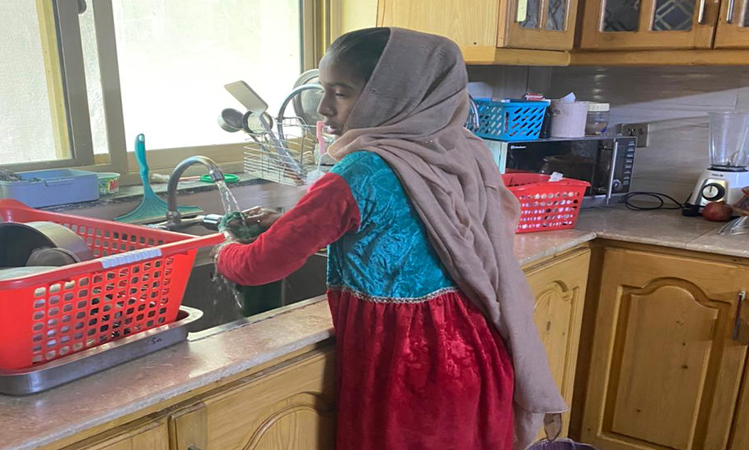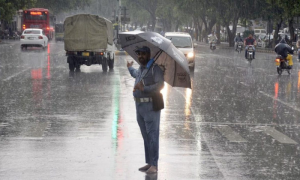ISLAMABAD: Away from home and forced to work as a housemaid, 14-year-old Fatima wants to go back home only to face her ‘unwelcome’ father who wants her to earn money for him no matter how she feels or what circumstances she faces at her employer’s house.
Fatima and many other girls and women are brought to big cities from villages for work. In some cases, they are willing to work but when it comes to minor girls, most of them left homes reluctantly and unwillingly.

Parents leave these minor girls to work at their employers’ homes for months and in some cases, for years, without bothering to inquire about their well-being.
Fatima is one such victim of child and bonded labour and forced migration. She was handed over to the employer by her parents after taking six-month upfront money, leaving their daughter in the lurch and without contact with family for months.
Fatima has been working at a house in Pakistan Town, a settlement in Islamabad’s suburbs along the expressway, for the last five months and this is her last month, as her contract may be extended or terminated by the employer, but she wants to quit.

Her father does nothing except search houses to find work for his four daughters including Fatima. “My sisters also work like me, they don’t return home for months and I don’t know in which city they are now,” said the visibly dejected child maid.
She was unaware of the payment she was getting but her employer said that she has paid Rs10,000 to the agent, and Rs36,000 to Fatima’s father for six months. The employer said that she wanted to retain Fatima’s service for another six months, but Fatima wanted to quit.
Fatima could not share under which circumstances she lived as her employer did not allow this scribe to talk to her in private. Anyhow, Fatima’s weary eyes and the fatigue on her face were enough proof to shed light on her plight.

Maids at home real victims of ‘closed doors’
In big cities like Rawalpindi and Islamabad, there is a strong demand for housemaids, and to cater to this demand, a mafia is actively working to bring girls from remote areas and villages of Punjab to homes in the twin cities for a handsome amount in the form of commission from both parties. These teenage and minor girls reluctantly agree to work due to their financial condition and the pressure of their families.
Children, especially minor girls brought from remote areas, are made to work as enslaved people and bonded labours behind closed doors by their parents or, sometimes, by their stepparents or relatives if they are orphans.
In several cases, parents or relatives never bother to inquire about their well-being or health for six to 12 months after vanishing from the scene with the upfront money.

When asked if she wanted to continue work or return home, Fatima replied with a sad smile and almost teary eyes: “I want to go home”. When asked whom she missed the most, she abruptly replied, mother and sisters. She shared that she hardly gets a chance to see her sisters when she gets an opportunity to visit home on vacation, as they, like her, work at different places as maids.
A group of people, involved in this dirty business of forced migration, charge a hefty amount for their service. They also work as an intermediary between employers and parents of the girls if something goes wrong or the children fail to adjust to the new environment and behaved-badly.
When the housemaids sometimes fail to get used to living with strangers or do chores according to the employers’ will, they are subjected to mental and physical violence.
Unfortunately, no government agency working on child rights including the Punjab Child Protection Bureau, the National Commission of the Rights of Child, or private organizations and NGOs such as SPARC and Sahil did not have data of child domestic workers at all, what to talk of the violence they face at the hands of their employers.
However, cases highlighted in the media depict the unending plight of such children in Pakistan, who have to undergo torture and violence behind closed doors.
In July 2022, two minor brothers were brought to Lahore from Karachi for domestic work by their parents, where one 10-year-old boy was tortured to death, and his younger brother was badly injured after their employer caught them stealing fruit.
In 2018, a 10-year-old maid, Tayyaba from Punjab, was brutally injured by a judge in Islamabad. In July 2020, 8-year-old Sana was rescued by the Punjab Child Protection and Welfare Bureau (CPWB) with severe marks of torture on her body. A 14-year-old housemaid was tortured and then threw her near a bus stop in Sargodha, Tanzeela, the victim, was sent by her parents to work at Saeed Niazi’s home a year ago, 16-year-old maid Uzma Bibi was allegedly tortured and murdered by her employer in Lahore and the list goes on.
The agent of Fatima, Muhammad Asif, when contacted by this scribe to provide a girl for domestic work against the upfront money of six months to one year. He asked to wait for a few days and after three days he said that “I am arranging a girl, who is available only for three months from Jhang.” He said, “I am also trying to find a girl for one year but unfortunately no one is available right now. You manage with this girl for three months until I look for another. I had my three daughters, whom I provided to employers as maids but now they are married off.”

Naeem Ahmed, a government servant who also supplies house servants in various sectors of Islamabad as a “side business”, told World Echo: “I only supply girls and boys aged 16 and above years and mostly ‘mature’ women for house chores. I know about the complications related to minor child domestic workers, and therefore, I avoid it.”
He said that most children are brought from the Punjab region including Sargodha, Layyah, Bhakhar, Kot Addu, and Jhang. He said that he knows many other agents who supply children on advance payment of months and in some cases for one year or even more. However, he refused to give the names of the other agents.
Maria Awan, the employer, where Fatima works, said that she was aware that child labour was illegal but she had no option. “I am a school teacher and have a small baby at home. I need help with house chores as well and have hired Fatima on advance payment of six months. Hiring such girls from remote areas suits me as they don’t go on holidays and no one comes from their home to disturb us,” Maria said.
She claimed that she cared for Fatima very well and provided her with a life she can’t have in her village.
When contacted, National Commission on the Rights of Child Chairperson Afshan Tehseen told World Echo that child labour in domestic work is most common with most children working in houses and without being visible. “There is no mechanism for monitoring the violence and exploitation they face behind closed doors and to rescue them from this vicious cycle of violence,” she said.
Talking about the data on migrant child labour in Pakistan, she said that there is no latest data available in Pakistan, the last survey was held in 1996 and currently, a survey is underway to collect data about child labour and violence. However, she said that the results cannot be shared till its completion as so far surveys reports from Punjab and Gilgit-Baltistan have been received.

“There is no proper legislation on migrant children as domestic workers in Pakistan. “Judiciary, legislators, and human rights activists have to play their roles to define the age and definition of child domestic labour,” she said.
On the other hand, an official in the Child Protection and Welfare Bureau Rawalpindi shared that five cases have been reported this year about child domestic violence and in all cases, the children were from far-flung areas away from homes. He said on the condition of anonymity that people do not register their cases fearing the penalty they may face for engaging their children as domestic workers at a tender age.
According to the International Labor Organisation estimate, around 264,000 children are employed as domestic workers across Pakistan but no detailed and specific data about child labour and domestic workers.























